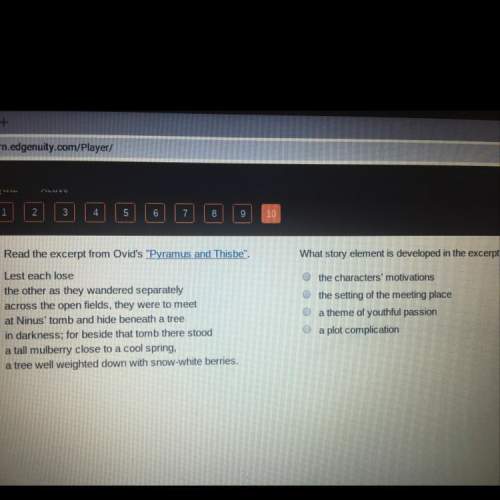
English, 06.01.2020 22:31 alyssanewsome
1) what is telemachusâ main diplomatic challenge in this book? how does athena him meet the challenge? 2) what role does helen play in this book? what does the prophecy she makes reveal about her? why might it be significant, in terms of the odyssey as a whole, that helen, whose misbehavior towards her husband set in motion the trojan war, gives telemachus a robe to bestow upon his future bride? 3) who is theoclymenus, and why is it appropriate that telemachus should treat him kindly? 4) what is eumaeusâ own story, as he recounts it to odysseus? does the story indicate why eumaeus is especially loyal to odysseus? if so, whatâs the reason?

Answers: 3
Another question on English



English, 22.06.2019 04:50
Read the passage, then answer the question that follows. no one could have seen it at the time, but the invention of beet sugar was not just a challenge to cane. it was a hint—just a glimpse, like a twist that comes about two thirds of the way through a movie—that the end of the age of sugar was in sight. for beet sugar showed that in order to create that perfect sweetness you did not need slaves, you did not need plantations, in fact you did not even need cane. beet sugar was a foreshadowing of what we have today: the age of science, in which sweetness is a product of chemistry, not whips. in 1854 only 11 percent of world sugar production came from beets. by 1899 the percentage had risen to about 65 percent. and beet sugar was just the first challenge to cane. by 1879 chemists discovered saccharine—a laboratory-created substance that is several hundred times sweeter than natural sugar. today the sweeteners used in the foods you eat may come from corn (high-fructose corn syrup), from fruit (fructose), or directly from the lab (for example, aspartame, invented in 1965, or sucralose—splenda—created in 1976). brazil is the land that imported more africans than any other to work on sugar plantations, and in brazil the soil is still perfect for sugar. cane grows in brazil today, but not always for sugar. instead, cane is often used to create ethanol, much as corn farmers in america now convert their harvest into fuel. –sugar changed the world, marc aronson and marina budhos how does this passage support the claim that sugar was tied to the struggle for freedom? it shows that the invention of beet sugar created competition for cane sugar. it shows that technology had a role in changing how we sweeten our foods. it shows that the beet sugar trade provided jobs for formerly enslaved workers. it shows that sweeteners did not need to be the product of sugar plantations and slavery.
Answers: 1

You know the right answer?
1) what is telemachusâ main diplomatic challenge in this book? how does athena him meet the challe...
Questions












Mathematics, 11.10.2020 23:01








Physics, 11.10.2020 23:01




